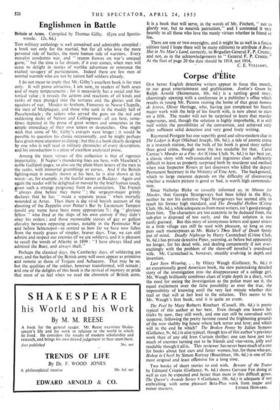Corpse d'Elite
OUR better English detective writers appear in force this month, to our great entertainment and gratification. Jenkin's Green by Ralph Arnold (Heinemann, 10s. 6d.) is a rattling good story, charmingly opening with a conference in a publisher's office which results in young Mr. Paxton visiting the home of that great homme de lettres, Oliver Heritage, who, having just completed his fourth major work with the help of his fourth wife, is now about to start on a fifth. The reader will not be surprised to learn that murder supervenes, and, though the solution is highly improbable, it is still well within the possibilities of the convention, and achieved only after sufficient solid detection and very good lively writing.
Raymond Postgate has one superbly good and ultra-modern clue in The Ledger is Kept (Michael Joseph, 10s. 6d.), a tale of atomic crime in a research station, but the bulk of his book is good story rather than good crime, though none the less readable for that. Carol Carnac's Murder as a Fine Art (Crime Club, 9s. 6d.) is her best yet, a classic story with well-concealed and ingenious clues sufficiently difficult to leave us properly surprised both by murderer and method when nice Inspector Rivers at last discovers who killed the deputy Permanent Secretary in the Ministry of Fine Arts. The background, which. to large measure depends on the difficulty of discovering whether a modern picture is good or bad, is worth high commenda- tion.
Since Nicholas Blake so casually informed us, in Minute for Murder, that Georgia Strangeways had been killed in the Blitz, neither he nor his detective Nigel Strangeways has seemed able to reach his former high standard, and The Dreadful Hollow (Crime Club, 10s. 6d.), while adequate as from most writers, isn't good enough from him. The characters are too eccentric to be deduced from, the sub-plot is disposed of too early, and the final solution is too easily guessed. But this story of anonymous letters and queer sisters in a little village can still be read with pleasure, so long as one puts such masterpieces as Mr. Blake's Thou Shell of Death firmly out of mind. Deadly Nightcap by Harry Carmichael (Crime Club, 9s. 6d.) has private detective Piper, yearning, as before but apparently no longer, for his dead wife, and dealing competently if not over- excitingly with the problem of the show-off novelist's overdosed wife. Mr. Carmichael is, however, steadily -evolving in depth and invention.
Last Seen Wearing. . . by Hilary Waugh (Gollancz, 9s. 6d.) is an exceptionally good American book, the slow painstaking detailed story of the investigation into the disappearance of a college girl. Mr. Waugh brilliantly combines clues of triple depth in a diary, with the need for seeing the investigation as the police must see it, the equal excitement over the false possibility as over the true, the impossibility of knowing until the very last minute whether this trail or that will at last lead to the solution. This seems to be Mr. Waugh's first book, and it is quite an event.
The Pool by Mary Roberts Rinehart (Cassell, 10s. 6d.) is pretty typical of this author at her best. Even though one knows her tricks by now, they still work, and one can still be convulsed with suspense, following the pretty heroine round the frightening grounds of the now shabby big house where lurk terror and love; and which will in the end be which? The Broken Penny by Julian Symons (Gollancz, 9s. 6d.) is also typical, though less of this author's previous work than of any old Iron Curtain thriller; one can have just too much of enemies turning out to be friends and vice-versa, jolly and readable though it all is. This reviewer has never been much of a one for books about fast cars and faster women, but, for those who are, Bishop in Check by Simon Rattray (Boardman, 10s. 6d.) is one of the most original and least offensive for a long time.
Two books of short stories to end with. Beware of the Trains by Edmund Crispin (Gollancz, 9s. 6d.) shows Gervase Fen doing as well as can be expected and better than most in this difficult genre. The Queen's Awards Series 6 (Gollancz, 10s. 6d.) is adequate if not enthralling, with some pleasant Beta-Plus work from major and


































 Previous page
Previous page